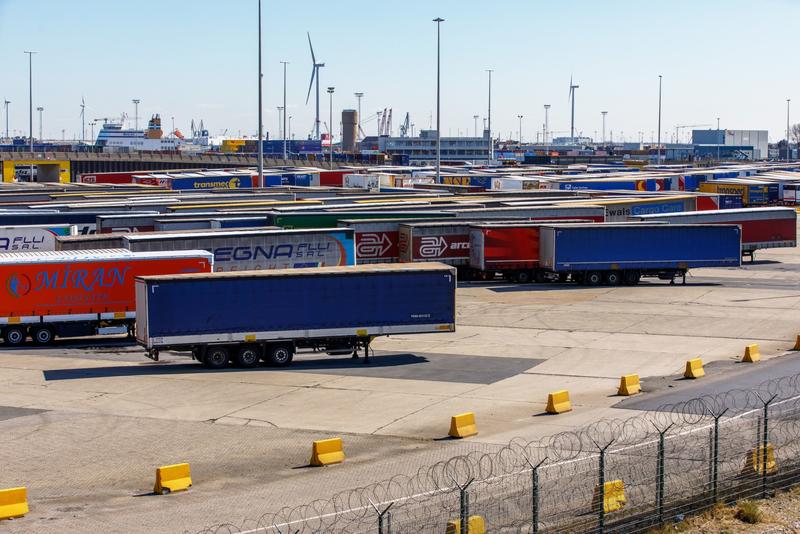 Haulage truck trailers parked at a cargo storage area at Port of Zeebrugge in Zeebrugge, Belgium, on March 31, 2020. (OLIVIER MATTHYS / BLOOMBERG)
Haulage truck trailers parked at a cargo storage area at Port of Zeebrugge in Zeebrugge, Belgium, on March 31, 2020. (OLIVIER MATTHYS / BLOOMBERG)
The US is weighing new tariffs on US$3.1 billion of exports from France, Germany, Spain and the UK, adding to an arsenal of measures the Trump administration is using against the European Union (EU) that could spiral into a wider trans-atlantic trade fight later this summer.
The US Trade Representative wants to impose new tariffs on European exports like olives, beer, gin and trucks, while increasing duties on products including aircrafts, cheese and yogurt, according to a notice published late Tuesday evening. The statement lays out a month-long public comment period ending July 26.
If the US follows through with its plan, it could hammer European luxury brands like Givenchy and Hermes - which produce leather goods - and Remy Cointreau and Pernod Ricard, which make cognac and champagne. LVMH Moet Hennessy Louis Vuitton would be particularly vulnerable because it produces a wide array of these products.
The US Trade Representative wants to impose new tariffs on European exports like olives, beer, gin and trucks, while increasing duties on products including aircrafts, cheese and yogurt, according to a notice
The move is related to Europe and America’s 15-year-old World Trade Organization (WTO) aircraft subsidy fight. A couple of years ago the Geneva-based trade arbiter said both the US and the EU were guilty of illegally supporting their respective aircraft industries.
In October the US gained the upper hand when the WTO authorized US President Donald Trump to retaliate against US$7.5 billion worth of EU exports in response to Europe’s illegal subsidies to Airbus SE. Next month the WTO is expected to deliver a retaliation award to the EU in its separate but related case against US subsidies to the Boeing Co.
ALSO READ: US-EU dispute over auto trade could get worse
Carousel of pain
In the meantime, Trump’s top trade official, Robert Lighthizer, has sought to increase pressure on the Europeans by deploying a particularly damaging tactic called “carousel retaliation,” whereby a country periodically shifts tariffs on different groups of goods.
Tuesday’s USTR notice is a reminder that the US’ tariff targets may shift or be subject to higher levies - a strategy that spreads the sanctions pain across an array of industries, creating uncertainty for businesses and headaches for exporters and importers alike.
Earlier this year, the US deployed its carousel retaliation strategy to increase tariffs on exports of Airbus aircraft and parts from 10 percent to 15 percent. To date the US has only deployed tariffs on goods worth about half of its permitted retaliation levels.
Lighthizer said his goal in increasing tariffs is to persuade the EU to agree to a settlement. But talks between the US and the EU have floundered this year, and now the EU is preparing to retaliate with new tariffs against an array of politically sensitive US industries.
READ MORE: EU ministers critical of US unilateralism
Stalled talks
“The US has stepped back from the settlement talks in recent weeks,” EU Trade Commissioner Phil Hogan told European trade ministers on June 9. “If this remains the case, the EU will have little choice but to exercise its retaliation rights and impose our own sanctions.”
The EU has asked the WTO to give it the green light to place levies on as much as US$11.2 billion worth of US exports to Europe in retaliation for America’s illegal subsidies to Boeing. The Trump administration argues the WTO award will be much smaller, with only about US$300 million at stake.
Regardless of the level of the WTO award, the US is now preparing to hit more European products as a means to dissuade the EU from retaliating at all.
“There is no valid basis for the EU to retaliate against any US goods,” Lighthizer said last month. “We will continue to press the EU to negotiate a resolution that respects the WTO’s findings.”


